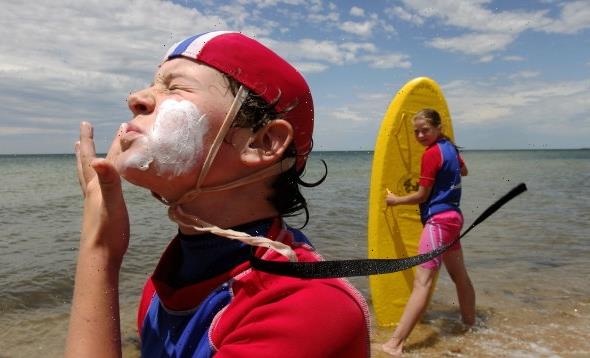
As we head into our first summer with likely no restrictions since the COVID-19 pandemic began, I – like many Australians – look forward to the outdoors, from backyard cricket to the beach.
With the timeless mantra “Slip, Slop, Slap” in mind, I find myself at the supermarket looking for sunscreen. It is astonishing that the cost is so exorbitant, given it is an essential item. For some brands, the price is as high as $34 for 50 grams. That raised a simple question in my mind: Why isn’t sunscreen free?
Children need to be encouraged to apply sunscreen from an early age, so at the very least, it should be provided for free in schools. Credit:Fairfax
According to the Melanoma Institute Australia, melanoma is the third most common cancer in the nation. It kills about 1700 people each year. Melanoma is particularly ubiquitous as it affects people of all ages and is the most common cancer diagnosed in Australians aged 20 to 39. Almost 17,000 Australians are diagnosed with melanoma every year.
These are staggering numbers, especially given that about 95 per cent of melanomas are caused by overexposure to UV radiation from the sun, and we know sunscreen helps protect against skin cancer.
Australia carries the highest skin cancer burden in the world, and yet there has not been any new national investment in preventing skin cancer for well over a decade. The rewards of government investment in public health measures, however, are well established.
The National Bowel Cancer Screening Program provides free testing, every two years, to all Australians aged 50 to 74. With participation rates of 50 per cent, as expected by 2030, it is estimated this program will reduce annual expenditure on colorectal cancer control by $2 billion, while its cost is about $150 million a year. It will reduce annual deaths by up to 25 per cent. It demonstrates that the return on public health investment can far outweigh the costs.
Limiting our time in the sun, wearing sun protective clothing, seeking shade and having regular skin checks with doctors are all important measures to protect against skin cancer. Equally, sunscreen and education are critical.
And yet, at a time when the cost of living is sky-high, the choice for many Australians could be between putting food on the table or buying sunscreen. This is no choice at all.
The Slip, Slop, Slap campaign changed the way Australians behaved in the sun. Despite it, and despite the majority of skin cancers being avoidable and curable, the annual cost to the public health system is estimated to be $1.7 billion.
Providing free sunscreen may be a world first but, given Australia’s high UV index and its sun-loving outdoor lifestyle, it is not an outlandish proposal. How many lives might be saved? It is reasonable to consider the return on public investment from bowel screening and expect similar bang for our buck.
With it, public health messaging is vital. As many as four in five Australians do not apply sunscreen correctly.
We need to encourage our children to use it from an early age, so at the very least sunscreen should be free in schools.
Despite significant evidence around the safety of sunscreen, there is misinformation about its use. The Cancer Council’s national sun-protection survey showed that only 55 per cent of adults recognised it is safe to use sunscreen every day, while 17 per cent believed ingredients in sunscreen were bad for health if used regularly.
We need to re-energise the conversation about skin cancer prevention. There is much more we can do to avoid the hardship, and costs, of this disease.
Narayan Khanal is studying medicine at the University of Wollongong. He represented Australia at this year’s Y20 Youth Summit in Jakarta and Bandung, one of the official engagement groups of the G20.
The Opinion newsletter is a weekly wrap of views that will challenge, champion and inform your own. Sign up here.
More original opinions
Poor little rich kids: There aren’t swathes of research on the woes of rich kids. There is some evidence they’re at greater risk of battling depression, anxiety and substance abuse, so why aren’t we talking about them more?
Morning checklist: There are three questions Jessica Irvine asks herself every morning, and if she can answer “no” to all three, it’s sure to be a good day.
Life’s golden rule: Being back in her old family home after a divorce and raising kids there was “beautiful agony” for Kate Halfpenny. That’s why she now never looks back.
Most Viewed in National
From our partners
Source: Read Full Article
